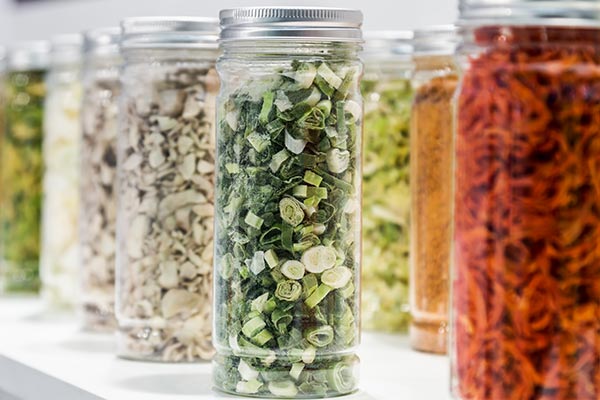
This can get expensive, which is why you should consider getting items that are worth each dollar, such as dehydrated or freeze-dried foods.
Both these processes preserve food for long periods of time, but they differ in how they remove moisture from the food. Here are some of the similarities, differences and benefits of dehydrated and freeze-dried foods. (h/t to ReadyProject.com)
What is dehydration?
Dehydration is a food preservation process that removes moisture from food by exposing it to heat.
The food being processed is sliced or diced and placed in a dehydrator, which blows hot air over the food for several hours. The heat causes the water in the food to evaporate, which makes the final product dry and brittle.
Dehydrated food offers some advantages for emergency preparedness and survival. Compared to other preservation methods, dehydrated food is lighter and takes up less space than fresh food, making it ideal for backpacking or camping trips. Lastly, dehydrated food can be rehydrated with water, making it versatile and convenient for cooking.
If you have a dehydrator, it easy and inexpensive to dehydrate different herbs, fruits and vegetables at home.
What is freeze-drying?
Freeze drying is a food preservation process that removes moisture from food by freezing it and subjecting it to a vacuum. The food is placed on trays and frozen to around -40 F.
When the food is frozen, it is moved to a vacuum chamber, and the pressure is lowered. This makes the frozen water in the food sublimate (turn directly from a solid to a gas) without passing through the liquid phase.
The vacuum also pulls the water vapor out of the chamber, leaving the food dry and lighter.
Freeze drying also offers advantages over other food preservation methods. It preserves the nutritional content of the food since the low temperature and short drying time minimize the loss of vitamins and other nutrients.
Freeze-dried food is also much lighter and easy to transport since most of the water has been removed. Lastly, freeze-dried food has a long shelf life. Some freeze-dried foods can be stored for up to 25 years. (Related: Debunking the TOP 5 MYTHS about emergency food storage.)
Similarities between freeze-dried food and dehydrated food
Both freeze-dried and dehydrated foods remove moisture from food to preserve it longer compared to other methods. But there are some key differences between the two processes.
Freeze-dried food is more expensive to produce than dehydrated food because the former requires specialized equipment and a longer drying time.
One of the benefits of freeze-drying food is that it retains more of its original flavor, texture and nutritional content than dehydrated food, which is subjected to a lower temperature and a shorter drying time.
The benefits of freeze-dried food and dehydrated food
Both freeze-dried and dehydrated foods offer some benefits for emergency preparedness and survival.
Both are lighter and easy to transport, which makes either of them ideal for your bug-out bags or emergency kits. Both kinds of foods also have a long shelf life, making them a reliable food source when facing an emergency.
Lastly, both are versatile and convenient since you can rehydrate them with water or use in recipes like fresh food.
Where to buy lab-verified freeze-dried fruits
The Health Ranger Store is committed to helping you prepare for any emergency. That's why we're proud to introduce different freeze-dried fruits such as Freeze-Dried Organic Whole Blueberries, Freeze-Dried Organic Mango Diced and Freeze-Dried Organic Strawberry Pieces.
Full of different essential nutrients, Health Ranger Select Freeze-Dried Organic Whole Blueberries are an excellent healthy snack you can enjoy all year round. They have been carefully freeze-dried to preserve the taste, texture and nutrients of fresh produce without using any chemical preservatives.
You can eat them directly or reconstitute them by simply adding water.
Health Ranger Select Freeze-Dried Organic Whole Blueberries contain no gluten or GMOs and have undergone extensive lab testing for glyphosate, heavy metals and microbiology. They are also vegan, non-China and certified Kosher and organic.
You can also try Freeze-Dried Organic Mango Diced, which you can store for up to 10 to 15 years, depending on storage conditions. Keep it in a dark, cool, low-humidity location and it will last for an extended duration.
Our freeze-dried mango pieces are grown in Mexico under strict organic standards. The freeze-drying method preserves taste, texture and nutrients better than any other food preservation method ever invented.
Eat Freeze-Dried Organic Mango Diced as a snack, sprinkle them onto cereals, or rehydrate them by soaking them in water.
Lastly, you can try Health Ranger Select Freeze-Dried Organic Strawberry Pieces, which are a tasty and healthy snack you can enjoy all year round. With their crispy texture and natural abundance of vitamin C and other beneficial antioxidants and nutrients, our freeze-dried organic strawberry pieces can add a burst of flavor and nutrition to all your favorite pancakes, muffins, pies, salads and baked goods.
They can even be eaten directly for a quick and healthy snack.
Health Ranger Select Freeze-Dried Organic Strawberry Pieces, which contain no gluten or GMOs and are certified Kosher and organic.
Our premium strawberry pieces are also vegan, non-China and have been meticulously lab tested for glyphosate, heavy metals and microbiology.
Go to Health Ranger Store and Brighteon Store to find more food supplies for your prepping needs. You can also visit FoodSupply.news for more ideas on how to build a reliable food stockpile.
Click this link to learn how to make Raw Strawberry Cheesecake.
Watch the video below to learn more about Organic Blueberries.
This video is from the Health Ranger Store channel on Brighteon.com.
More related stories:
The best foods to dehydrate for your survival food stockpile.
Top canned foods with the longest shelf life.
Smart prepper tips: Stock up wisely for any situation.
Prepping tips: Stockpiling non-perishable foods and water.
Sources include:
Please contact us for more information.






















